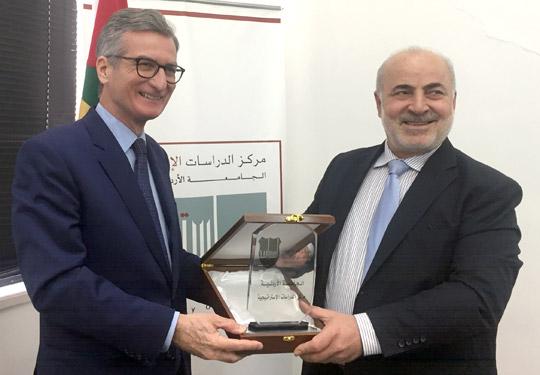You are here
Jordan shows the true face of Islam — Spanish envoy
By Suzanna Goussous - May 03,2017 - Last updated at May 03,2017

Spanish ambassador Santiago Cabanas Ansorena and the Centre of Strategic Studies’ Director Musa Shteiwi at the University of Jordan on Wednesday (Photo by Suzanna Goussous)
AMMAN — From its birth as a nation, Jordan has reinforced its influence in the world through presenting itself as a model of dialogue and moderation, which is part of the “Jordan brand” to promote intercultural and interreligious dialogue, the Spanish ambassador to Jordan said on Wednesday.
Living in harmony is a “banner” that had been held high by officials in the country, including His Majesty late King Hussein, His Majesty King Abdullah II, HRH Prince Hassan and the Royal Institute for Interfaith Studies, Santiago Cabanas Ansorena said during a meeting at the Centre of Strategic Studies at the University of Jordan.
He said that during his mission in Jordan, there was “clear leadership in the fight against terrorism”, adding that “in the last months of 2014, [there was] a growing involvement of Jordan in the fight against terrorism, especially after the cruel assassination of Lt. Muath Kassasbeh by Daesh.”
As he concludes his mission in Jordan, the ambassador said the Jordanian leadership proved to the world that “there is another Islam — real Islam” and that “it is important because it has a vision, a positive vision [with] a moral value”.
On May 24, the foreign ministers of Spain and Jordan are due to organise a conference in Madrid on the protection of religious minorities in the Middle East, the ambassador told reporters.
Over the past four years, there have been several important developments, Cabanas Ansorena said, including the rise of terrorism, the emergence of China as a global political, economic and military power which has asserted its influence, especially in this part of the world, as well as the worsening of the war in Syria.
“I have also seen a great disparity between economic globalisation and political fragmentation. This has many effects, but one of them is… the questioning of [an] old system that has ruled the world since WWII,” the ambassador added.
“In this very difficult environment, Jordan has, in spite of it all, strengthened its diplomatic standing and leadership in the world… the process of reforms has continued, which maintained stability in the country,” Cabanas Ansorena stated.
As Spain was experiencing an economic crisis back in 2013, the ambassador said that, when he arrived, the Spanish Agency for International Development and Cooperation was about to close its office in Amman, but he insisted on leaving it open.
“Since [2013], trade has doubled; when I arrived, it was 200 million Euros, now it is 430 million… The investments and operations of Spanish companies have boomed… In Aqaba, Zarqa [and] north Amman,” Cabanas Ansorena added.
The number of visas provided to Jordanians to visit Spain has also doubled, from 4,000 to almost 8,000, while the number of Spanish tourists in Jordan is also increasing, with the number having risen by 10 to 15 per cent last year.
The director of the university’s Centre of Strategic Studies, Musa Shteiwi, said Jordan and Spain have a long history of friendly relations.
“The relations continued to grow and expand in the last 70 years, based on mutual respect and a deep commitment from the two countries to peace, pluralism and development,” Shteiwi said.
He added there were many projects in cooperation with the Spanish embassy in Jordan, including the “Tahdir-Masar” (preparation), project, which provides training to Syrian refugees in post-conflict state building, in collaboration with the Agency, AECID and partners in Spain and the EU.
Related Articles
Culture Minister Lana Mamkegh on Sunday met with Spanish Ambassador to Jordan Santiago Cabanas Ansorena and discussed means to boost cultural cooperation.
AMMAN — Spanish Cooperation and the EU on Wednesday launched a new programme in Jordan that seeks to build the capacities of Syrians to enab
AMMAN — Senate President Faisal Fayez on Tuesday met with Spanish Ambassador to Jordan Santiago Cabanas Ansorena and discussed bilateral rel
















